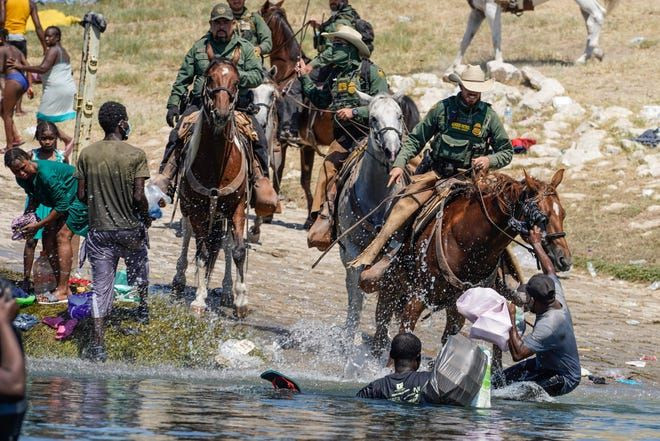
Controversy ensued in September 2021 at the border as pictures and video appear to show horse-mounted border patrol officers charging against Haitian asylum seekers, attempting to drive them back across the Rio Grande.
A Washington D.C federal judge held a hearing this week over a motion to dismiss a lawsuit against the government for the behavior of the border patrol officers back then. The hearing concluded without success for the U.S. government, with District Judge Jia Cobb requesting further written arguments from both sides.
Grassroots nonprofit Haitian Bridge Alliance, in partnership with Innovation Law Lab and Justice Action Center, presented the civic case alongside a group of sixteen Haitian asylum seekers who, according to the filling, "were victims of U.S. officials' abusive treatment in the Customs and Border Protection encampment and expelled without an opportunity to access the U.S. asylum system."
The lawsuit names President Joe Biden, Homeland Security Secretary Alejandro Mayorkas, the U.S. Customs and Border Protection, and The CDC, among other federal agencies and officials as the defendants in this case that seeks accountability, as stated in the lawsuit, "for the unconscionable actions taken by Defendants in 2021, in what is now the single largest expulsion event in recent U.S. history."
In the Thursday hearing, the administration lawyers called for the lawsuit "to be tossed as moot now that the Centers for Disease Control and Prevention program is no longer in effect," as reported by Law 360.
"Past injuries cannot establish standing to seek injunctive and declaratory relief as the plaintiffs are seeking," Assistant U.S. attorney Sean Tepe.
Mirard Joseph, one of the plaintiffs in the case, was one of the Haitian men photographed holding two bags of food in the controversial pictures of the law enforcement officer on horseback. The complaint details how the government's lack of infrastructure and preparation to implement Title 42 led to the creation of an encampment with approximately 15,000 migrants waiting outside of makeshift processing center under the Del Rio International Bridge.
With limited food, water and diapers for his 1-year old daughter, Joseph and other asylum seekers crossed the Rio Grande back into mexico, seeking to buy food and supplied. On the way back, the group was met by border patrol and chaos unraveled.
"U.S. officials on horseback chased and lashed [Joseph], and tried to force him back to Mexico," the lawsuit claims. Two days after the pictures were taken, Joseph, his wife and his daughter were expelled back to Haiti. For this reason, he and his family "never had the chance to seek protection in the United States."
The class action lawsuit, filed in December 2021, led to an investigation of the horse patrol activity.
"The allegations in this lawsuit — including new claims that Border Patrol agents used horse reins as whips on Haitian migrants — are appalling," said Rep. Bennie G. Thompson, the chairman of the House Homeland Security Committee, in a statement at the time. "We cannot tolerate the inhumane treatment of migrants."
The subsequent investigation released on July 2022 by U.S. Customs and Border Protection determined that "the agency failed to appropriately task, supervise, and exercise command and control over the Horse Patrol Units in Del Rio on September 19, 2021. Several Border Patrol Agents used force or the threat of force to attempt to drive migrants back into the Rio Grande River towards the U.S.-Mexico border, though there is no evidence that any migrants were forced to return to Mexico or denied entry to the United States."
The lawsuit asks for the United States to enact multiple orders that would potentially allow individual plaintiffs and class members to seek legal status in the country for those who stayed and to facilitate the return of those who were expelled so that they can pursue asylum cases.
Haitian Bridge Alliance also seeks for the court to award the plaintiffs "their costs of suit and reasonable attorneys' fees and expenses." Judge Cobb questioned if the organization had any standing given that their claimed harm was that "they'd had to commit more resources to more complicated immigration proceedings under Title 42 and subsequent asylum changes," according to Law 360.
© 2025 Latin Times. All rights reserved. Do not reproduce without permission.




